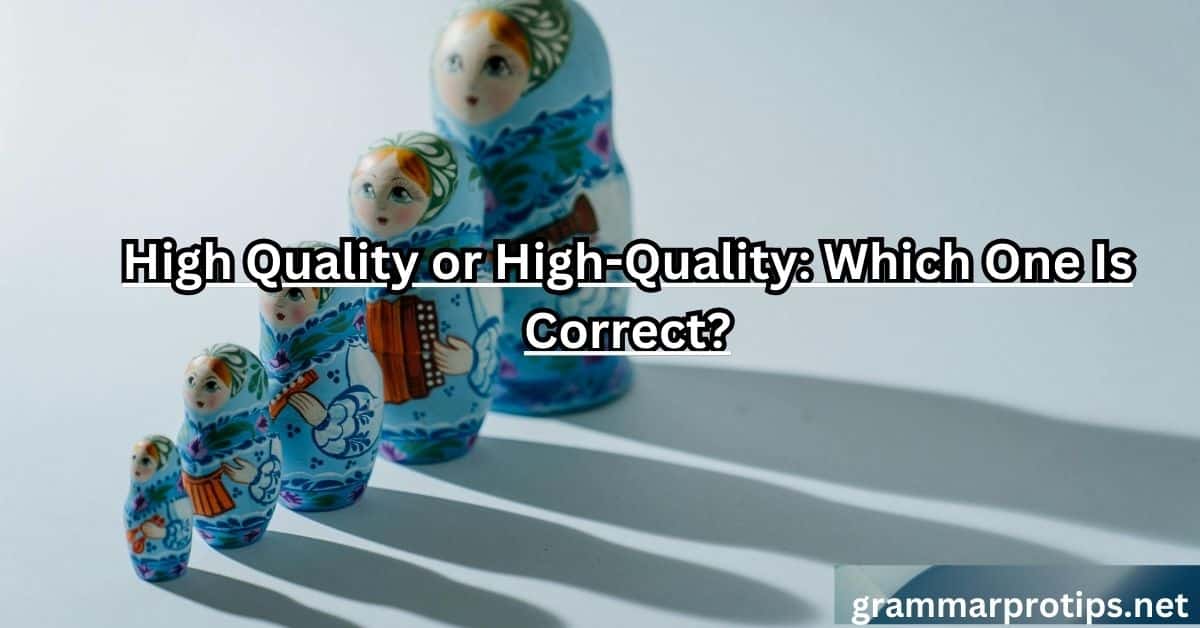When writing, grammar and style rules can be tricky, especially when it comes to hyphenation. One of the common questions many people have is whether the term “high quality” should be hyphenated. Should it be “high-quality” or “high quality”?
This article will dive deep into this topic, offering explanations, examples, and scenarios to help you navigate this confusion with confidence.
What Is the Difference Between “High Quality” and “High-Quality”?
At first glance, the difference between “high quality” and “high-quality” might seem subtle, but it’s important to use them correctly to maintain clarity and professionalism in your writing.
High Quality
“High quality” refers to something of superior standard or excellence. In this case, the phrase is typically used when describing a noun, such as a product, service, or experience, without the need for hyphenation. The key here is that “high quality” works when the phrase is used as a noun or as part of a larger sentence.
Example in an Email:
Imagine you’re writing an email to a client, discussing a product you offer. You might say:
Dear Mr. Johnson,
I wanted to follow up on our recent discussion about the new product. We pride ourselves on providing high quality materials that exceed industry standards. I believe this will be the perfect addition to your company’s inventory.
In this case, “high quality” is used as a description for materials, but it isn’t hyphenated because it’s not directly modifying the noun.
High-Quality
On the other hand, “high-quality” is a compound adjective, meaning it is used to describe a noun directly. In this case, the hyphen is necessary to make it clear that both words act together as a single descriptive unit, especially when they appear before the noun.
Example in an Email:
Consider another email to a client where you’re describing the same product:
Dear Mr. Johnson,
I wanted to reiterate that the product we discussed is made of high-quality materials. It’s designed to last for years, ensuring you receive exceptional value for your investment.
Here, “high-quality” directly describes the noun “materials,” so it’s hyphenated to show that the two words together modify the noun.
Is High Quality Hyphenated?
The question “Is high quality hyphenated?” is a valid one, and the answer depends on how the phrase is used. When you use “high quality” as a noun or in a sentence without directly modifying a noun, you don’t need a hyphen. For example, “Our company is known for its high quality.”
However, when the phrase is used as an adjective before a noun, you should hyphenate it. For instance, “We offer high-quality products.”
Table of High Quality vs. High-Quality Usage
Here’s a quick comparison of the two terms in different contexts:
| Context | Example | Hyphenation |
|---|---|---|
| Noun (not modifying a noun) | The product is of high quality. | No |
| Adjective (modifying a noun) | The company sells high-quality electronics. | Yes |
| Noun phrase (after the noun) | The high quality of the product impressed me. | No |
| Adjective phrase (before noun) | She prefers high-quality fabric for her designs. | Yes |
When Should “High Quality” Be Hyphenated?
The general rule to remember is that “high quality” should be hyphenated when used as a compound adjective before a noun. If you’re simply talking about the quality itself without using it to modify something, no hyphen is needed.
For example:
- “We expect high-quality results.” (Here, high-quality modifies “results.”)
- “The results were of high quality.” (Here, “high quality” refers to the type of results, but it’s not modifying anything directly.)
Why Does This Matter?
Getting the hyphenation right matters for clarity and professionalism. Misusing hyphens can create confusion for the reader. For instance, “high quality service” could be misinterpreted as two separate qualities (high and quality), while “high-quality service” clearly shows that both words describe the service together.
High Quality vs. High-Quality: When to Use Each One?
This distinction is subtle but important. To sum up, here’s when to use each phrase:
- High quality (no hyphen): Use when the phrase is used as a noun or when it follows the noun it describes. This is often the case in general statements.Example:
- “This is a product of high quality.”
- “The product has high quality.”
- High-quality (with hyphen): Use when the phrase acts as a compound adjective before the noun it describes.Example:
- “We offer high-quality products.”
- “She bought a high-quality chair for her office.”
Common Mistakes to Avoid
- Using “high-quality” after the noun:
Incorrect: “This product has high-quality.”
Correct: “This product has high quality.” - Failing to hyphenate before a noun:
Incorrect: “We offer high quality products.”
Correct: “We offer high-quality products.” - Adding extra hyphens when not needed:
Incorrect: “She bought high-quality fabric for her designs last week.”
Correct: “She bought high-quality fabric.”
Why Does Hyphenation Matter?
While it might seem like a small issue, hyphenation actually plays a big role in clarifying meaning. By using hyphens correctly, you can make your writing easier to read and understand, avoiding any ambiguity or confusion. For example, a high-quality product is something that is of superior standard, while a high quality product could be interpreted as something that has both “high” and “quality” as separate qualities.
Scenarios in Professional Communication
Understanding the correct use of “high quality” vs. “high-quality” can be particularly useful in professional settings, such as emails, reports, and presentations.
Example 1: Email to a Client
Subject: High-Quality Products for Your Business
Dear Mrs. Lee,
Thank you for reaching out to us. We are excited to help you find the best products for your needs. Our team prides itself on offering high-quality goods that adhere to the highest industry standards.I have attached a catalog of our products, and I believe the high-quality materials we offer will be an excellent fit for your company. Please let me know if you have any questions or would like to schedule a meeting to discuss further.
Best regards,
John Simmons
Sales Representative
In this email, “high-quality” is correctly used before nouns (products and materials), indicating that both words describe the nouns together.
Example 2: Report or White Paper
The high-quality equipment provided by the manufacturer resulted in a smoother production process. As evidenced by the high quality of the final product, the investment in better tools paid off.
In this case, the first sentence uses “high-quality” to describe equipment, while the second uses “high quality” to refer to the end product without directly modifying it.
Conclusion: The Right Choice for Your Writing
Choosing between high quality or high-quality comes down to understanding whether you’re using the phrase as a noun or adjective. If you’re describing something directly and the phrase comes before the noun, hyphenate it. Otherwise, if you’re using the phrase as a noun or following a noun, keep it unhyphenated.
Mastering these small grammar rules can make a significant difference in your writing, improving your clarity and professionalism. So, the next time you’re wondering, “Should high quality be hyphenated?” remember to consider the context carefully.
Happy writing!

Sienna Mauldon is a passionate writer and grammar expert. On her blog, she shares easy-to-follow guides to help readers master grammar rules and improve their writing. With a love for language and teaching, Sienna makes grammar simple and fun for everyone, from beginners to experienced writers.








